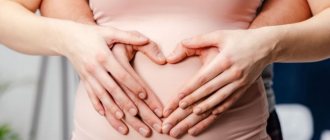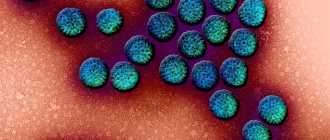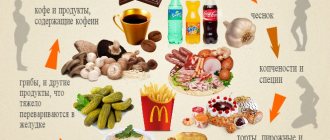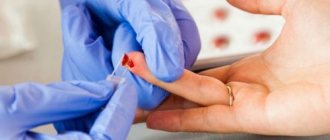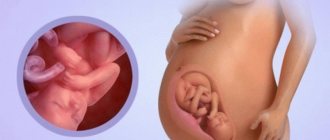Rotavirus is an acute infectious pathology caused by rotavirus and affecting the gastrointestinal tract. The pathology transmitted by tactile contact provokes the appearance of repeated vomiting, intestinal upset and a febrile state that lasts for 5-7 days.
Due to weakened immunity, rotavirus infection often affects expectant mothers in the 1st, 2nd or 3rd trimester of pregnancy, causing them not only discomfort, but also increasing the likelihood of intrauterine death of the child. In some cases, ignoring the disease can also cause premature labor or endanger the life of a young mother.
Causes
Rotavirus during pregnancy (the 1st trimester is characterized by fatigue, nausea or frequent urination) in most cases is transmitted by contact through the interaction of a woman with a previously infected person.
The expectant mother can also become infected:
- when processing raw meat products, poultry or fish;
- when eating poorly peeled vegetables and fruits;
- when using tap, unboiled water for drinking;
- coming into contact with contaminated feces or vomit during cleaning.
Most often the disease is diagnosed in women in the 2nd trimester of pregnancy. During this period, the young mother’s hormones most strongly influence her digestive system, relaxing the intestinal muscles and reducing the body’s resistance to pathogenic external influences.
Smoking and chances of conceiving
“I’ll see two stripes and immediately quit!” - expectant mothers reassure themselves. However, the effect of habit on a woman’s health is such that the desired pregnancy may not occur. The effects of smoking are as follows:
- the menstrual cycle is disrupted (amenorrhea, irregular menstruation);
- reduces the chance of pregnancy;
- The duration of childbearing age is shortened.
Smoking leads to disruption of the DNA structure of eggs, which reduces the chance of embryo development and increases the likelihood of miscarriage.
Speaking about the role of men, doctors talk about damage to sperm, impaired motility, decreased concentrations of androgens, and even the development of impotence. Russian reproductive specialists also shared information about the dangers of male smoking. Thus, the presence of a bad habit only in the future father reduces the chance of pregnancy as a result of IVF from 32 to 18%.
Symptoms
Rotavirus during pregnancy (the 2nd trimester is characterized by the disappearance of nausea and improved appetite) is dangerous for young mothers with the risk of developing spontaneous miscarriage, which occurs against the background of dehydration and intoxication of the body.
Unpleasant symptoms of the disease occur in the expectant mother within 12 hours from the moment of infection and manifest themselves:
- high body temperature and feverish condition;
- severe, repeated vomiting;
- sharp, cramping pain that occurs in the upper abdomen;
- flatulence and rumbling in the intestines;
- watery diarrhea and frequent bowel movements (from 3 to 20 times a day).
In the first days of the disease, according to doctors, one can also observe the appearance of a moderately severe, short-term catarrhal syndrome, accompanied by nasal congestion, runny nose and cough. The temperature reaction (up to 38-39°C) can last from 3 to 5 days and is complicated by intoxication of the body, which is characterized by: lethargy, weakness and loss of appetite.
Unpleasant manifestations of the disease persist for 7-10 days, and over the next 2 weeks the young mother is a carrier of the virus and can be contagious to those around her.
Escherichia coli
Often, analysis shows the presence of E. coli in urine and culture during pregnancy. When discovered, the woman is very frightened. The bacterium can have a strong effect on the intestinal system, causing severe disorders - vomiting, diarrhea. Habitat: large intestine, bladder. An acceptable limit for the content of E. coli in urine has been established, but it should not be present there.
Symptoms:
- Diarrhea.
- Vomit.
- Fever.
- Nausea.
- Loss of appetite.
- Nagging pain in the abdomen.
The disease is dangerous for the expectant mother and fetus. It can greatly reduce a woman’s immunity, making the body vulnerable to disease. First, the bacterium (Escherichia coli) enters the urinary tract, from where it rises to the bladder. The child develops pathologies that can lead to death.
Escherichia coli bacterium
Prevention
To ensure that E. coli is not found in bacterial culture or discharge from the bladder, careful prevention of the disease is carried out.
- Follow the rules of personal hygiene. You need to wash in the direction from the vagina to the anus. Otherwise, fecal residues will be carried into the vagina and the bacteria will appear in the urinary tract.
- You can't wear thongs all the time. Lingerie creates a friction effect and affects the transfer of infection to the vagina.
- Avoid sexual intercourse with a mixture of intestinal and genitourinary microflora.
- Do not use scented pads or toilet paper.
The rod can live in the body without manifesting itself. A woman lives her life to the fullest and is unaware of the presence of E. coli in her bladder. It is recommended to undergo tests periodically. The doctor prescribes a culture and a smear during pregnancy to determine the presence of infection. Pregnancy management is carried out in such a way that tests are taken from trimester to trimester. It is impossible to miss E. coli in the culture - the analysis is taken frequently in order to catch a possible infection in time and prevent its progression.
Escherichia coli test
Treatment
If the analysis shows the presence of infection, begin treatment. It causes a serious kidney disease - pyelonephritis. The disease is dangerous during pregnancy. With pyelonephritis, severe pain occurs. It is easier to prevent than to cure - the kidneys suffer. There remains a danger for the child. Pregnancy ends in miscarriage, intrauterine death of the fetus, and death of the mother.
During pregnancy, gentle treatment is used. Less commonly prescribed are serious drugs that affect the child - Canephron, Amoxiclav, Furagin.
E. coli is treated with folk remedies. Plantain decoction, sunflower, and celandine are used. Before self-medication during pregnancy, you should consult your doctor.
Classification
In medical practice, rotavirus infections are usually classified depending on the stage of symptom severity:
| Degree of disease | How does it manifest itself? |
| Mild severity | Pathology appears:
|
| Moderate degree | Characterized by:
|
| Severe form of the disease | In addition to the classic symptoms of rotavirus, it manifests itself by the development of a state of shock:
|
According to the clinical form, the disease, in accordance with the International Classification of Diseases (ICD-10), is divided into:
| Type of infection | Her characteristics |
| Typical rotavirus infection | The pathology begins suddenly and manifests itself with classic signs of infection, occurring against the background of general intoxication of the body. |
| Atypical form of the disease | The disease can occur in 2 variants:
|
Poisoning during pregnancy
During pregnancy, a woman needs to be doubly careful in consuming foods. At risk are meat and sausage products, dairy products, canned food, and mayonnaise salads. Fungi pose a great danger to the life of the embryo - toxins are able to overcome the placental barrier and affect the fetus.
Symptoms of poisoning during pregnancy:
- Nausea.
- Vomit.
- Diarrhea.
- Stomach ache.
- Rare fever.
If vomiting occurs once, loose stools 2-3 times a day, and the temperature does not rise, you can treat yourself. If the condition is severe, it is better to consult a doctor.
Treatment
Remove the poison from the stomach. It is better not to induce vomiting - the body will cope. The only help is drinking plenty of fluids. With the help of water, the toxic product will leave the body faster. After emptying your stomach, take an absorbent (Activated Charcoal) that binds toxins for further elimination.
When the condition improves, restore the loss of fluid - boiled water will do.
Poisoning during pregnancy requires a diet. Do not refuse food - you need to eat light food, in small portions. You can eat porridge with water, mashed potatoes, boiled meat, fish, tea with dry bread, cookies.
Diagnostics
Rotavirus during pregnancy (the 3rd trimester is characterized by the fact that the child moves more and more often) is diagnosed by an infectious disease doctor based on a study of symptoms and after collecting a complete history of the disease.
To clarify the diagnosis, a pregnant woman may be prescribed a stool test to detect the presence of rotavirus antigen and a serological blood test. After a diagnosis has been made, a pregnant woman should definitely visit a gynecologist to adjust the treatment prescribed by the infectious disease specialist and to subsequently monitor her condition and the course of pregnancy.
Treatment
Treatment of pathology during pregnancy is pathogenetic (aimed at treating the pathogenesis of the disease) and symptomatic (used to eliminate the symptoms of the disease) in nature.
Pathogenetic method
With the pathogenetic method, therapy is aimed at restoring water and electrolyte balance in cases of mild, moderate or severe dehydration. According to the recommendations of the World Health Organization (WHO), pregnant women who have encountered rotavirus should be prescribed water-salt solutions containing glucose and sodium, taken in equal proportions (1:1), to restore the optimal amount of fluid in the body, because:
- The use of liquid with a high glucose level increases diarrhea and reduces water absorption.
- The use of solutions with high sodium content may cause the development of hypernatremia (increased amount of sodium in the blood)
Oral rehydration prescribed for the treatment of rotavirus is divided into:
| Treatment phase | Her characteristics |
| Rehydration phase of treatment | It is necessary to quickly replenish fluid deficiency in the body within 3-4 hours and allows the patient to return to the state prior to dehydration. |
| Maintenance phase | Continues to replenish fluid lost by the body until vomiting and watery stools completely disappear. |
To carry out oral rehydration, a pregnant woman is prescribed water-salt solutions (Regidron, Normohydron) used during the first 6-10 hours in an amount twice as high as the loss of body weight caused by diarrhea.
In severe cases of the disease, rehydration therapy is carried out intravenously.
Symptomatic method
Symptomatic therapy for rotavirus infection includes the use of probiotics, sorbents and drugs that stop diarrhea.
The World Health Organization (WHO) recommends the following for the treatment of rotavirus infection in pregnant women:
- Probiotics containing bacteria Lactobacillus GG, Saccharomyces boulardii, Lactobacillus reuteri strain DSM 17938 (“Lactofiltrum”, “Bifidumbacterin”), helping to reduce the duration and intensity of the symptoms of the disease.
- Sorbents containing dioctahedral smectite, which stabilizes the mucous barrier of the digestive system and has the cleansing qualities necessary for the adsorption of bacteria, viruses and toxins located in the gastrointestinal tract (GIT).
- Antidiarrheal drugs based on loperamide, which slows down propulsive intestinal motility. Due to its active properties, Loperamide hydrochloride also increases the tone of the anal sphincter, increasing the retention time of feces and reducing the frequency of bowel movements.
These pharmaceutical drugs are freely sold through retail pharmacy chains and do not harm the embryo even during the 3rd trimester of pregnancy. The treatment regimen and dosage of medications is selected by a specialist individually depending on the general condition of the woman.
Preparations based on diphenyl oxalate, atropine or bismuth subsalicylate are prohibited for use by expectant mothers.
In addition to using drugs that are safe for a young mother and her baby during illness, a woman needs to:
- Eat fermented milk products (acidolact, bio-yogurt, kefir) containing lactic acid bacteria, which are necessary to restore intestinal microflora and prevent dysbacteriosis.
- Maintain bed rest.
- Drink plenty of fluids.
If an upset stomach is complicated by constant vomiting, experts recommend that the expectant mother give up solid food for a while. As your condition improves, you can gradually introduce boiled rice and oatmeal into your diet. Doctors also strongly advise pregnant women to avoid a variety of fruits and vegetables, salads and purees during their illness.
Methods of infection
The peak incidence of rotavirus infection occurs in the warm seasons - spring and summer. There are only 2 types of transmission of rotavirus from an infected person:
- Fecal-oral – due to insufficient hygiene of the patient. Viral particles can persist for a long time in water (therefore, infection often occurs after swimming in the sea), on household objects, and on hands.
- Airborne transmission is through coughing or sneezing in close contact with an infected person. This method of infection is rarer, since the concentration of viral particles in saliva is much lower than in feces.
After the virus enters the human body, it multiplies in the intestines. Clinically, this time does not manifest itself in any way and is called the incubation period. Its duration averages from 2 to 5 days. The duration of the incubation period depends on the number of viral particles that have entered the body and the presence of concomitant diseases of the gastrointestinal tract.
Possible complications
Rotavirus during pregnancy (the 3rd trimester is characterized by the fact that all organs of the child have formed) is dangerous for a young mother due to rapid dehydration of the body. Despite its infectious nature, the disease, according to experts, does not affect the development and formation of the embryo.
- In the early stages of pregnancy, the body of a young mother is weakened by hormonal changes and the onset of toxicosis, which, with the appearance of a rotavirus infection and the development of a febrile state, leads to rapid dehydration of the body and can provoke a miscarriage, pathologies of fetal development, and placental abruption.
- In the later stages of pregnancy, a fully formed placenta protects the baby, but high temperature, intoxication and dehydration of the young mother’s body can trigger the onset of premature birth.
Dehydration
When dehydration begins, it is typical:
- the appearance of a strong feeling of thirst, accompanied by lethargy and drowsiness;
- sunken eyes;
- feeling of dry mouth;
- the appearance of small cracks in the tongue.
When these symptoms appear, the young mother needs to drink as much fluid as possible, as well as use pharmacy rehydration solutions.
Vomiting with diarrhea that does not stop for 3-4 days is the basis for urgent hospitalization of a pregnant woman in a hospital for corrective therapy.
Hospitalization for a pregnant woman is necessary:
- with foggy consciousness;
- with continuous watery vomiting;
- with blackening of stool;
- when blood or pus appears in the urine;
- when body temperature rises to 38-39°C, and does not subside during the day.
Prevention of dehydration
When infected with rotavirus infection during pregnancy, experts advise expectant mothers to make efforts to prevent possible dehydration by:
- including bananas in your diet, eliminating a possible decrease in the amount of electrolytes;
- drinking large amounts of liquid (water with salt and sugar).
A woman can also prevent dehydration with a diet that slows down stomach upset and includes:
- boiled rice;
- cracker;
- raisins and dried apricots;
- bran;
- whole grain pasta.
At the same time, the expectant mother needs to avoid foods that increase intestinal upset:
- various sweets;
- fatty, hot and spicy dishes;
- dairy products;
- drinks containing caffeine.
Convulsions
The appearance of seizures that occur against the background of rotavirus infection is characterized by short focal seizures observed within 2-3 days. The complication relates to neurological pathologies and is caused by a decrease in the amount of sodium in the blood of a young mother. The pathology, which occurs in a mild form, has a favorable prognosis and stops with corrective treatment.
Bacteremia
If a febrile state persists during a rotavirus infection for more than 3 days, bacteremia may develop due to the addition of secondary bacterial infections.
The danger of this pathology is due to the fact that enterocytes, weakened by an infectious disease and the long-term persistence of a febrile state, are unable to promptly prevent the activity of pathogenic microorganisms that have entered the body of the expectant mother.
Long-term consequences of smoking for a child
WHO experts and pediatricians from the UK and USA analyzed the physical health and mental development of children born to smoking mothers. They compared them with the guys from the control group and found:
- the presence of neurological abnormalities (changes in the EEG, behavioral disorders, attention);
- hyperactivity syndrome is much more common;
- children fall behind in the exact sciences in primary school and have difficulty learning to read;
- show worse results in psychological tests, adapt poorly to stress;
- are lagging behind their peers in height (by 1 cm or more);
- often seek medical help for respiratory diseases, including bronchial asthma.
Some sources indicate that smoking during pregnancy increases the likelihood of developing autism by 30-40%. British scientists emphasize that both active and passive smokers are at risk, but a direct connection between cigarettes and mental disorder has not yet been established.
Continuing a bad habit during breastfeeding also threatens the child’s health. Harmful components get into milk. Nicotine leads to the formation of addiction and has a toxic effect on the nervous system, disrupting its further development. Other ingredients of the tobacco “cocktail” increase the risk of malignant tumors, respiratory pathologies, allergic and systemic diseases. We should not forget that such babies remain at risk of sudden death. Smoking also reduces milk production.
How to prevent disease
Prevention of rotavirus infection during pregnancy is due to compliance with hygiene rules, which include:
- mandatory cleansing of hands before eating and after any physical contact;
- in washing fruits and vegetables before eating them;
- in timely change of clothes;
- when used for drinking only boiled or bottled water;
If a pregnant woman needs to come into contact with a child who has recently had an infectious disease, it is recommended:
- use of a disposable mask;
- refusal to change diapers, since the virus can be transmitted through feces, or carrying out this procedure in special disposable (latex) gloves.
Vaccination
Timely vaccination is considered the most effective way to prevent possible infection with rotavirus infection.
In the Russian Federation, vaccination is carried out with the drug RotaTek - a live, pentavalent vaccine made from a weakened bovine strain of the WC3 virus.
The drug is used for immunization of adults and children starting from six months of age. Vaccination consists of 3 stages, carried out with an interval of 4 weeks, and should be performed at the stage of pregnancy planning.
A vaccine study conducted as part of a combined retrospective study (REST) was organized by specialists from the World Health Organization (WHO) and established that the combination drug RotaTek:
- promotes a 3-fold increase in antibodies (in more than 97% of vaccinated people);
- 75% contributes to the development of protection in the body against rotavirus infection of any severity;
- reduces the likelihood of severe infection by 98%;
- reduces the number of hospitalizations due to rotavirus by 96%.
Rotavirus in children
Symptoms in children
In children, immediately after the end of the incubation (latent) period, an acute clinical picture of the disease is observed. From the first day, body temperature rises, nausea, vomiting, and loose stools appear. Diarrhea due to rotavirus has its own specificity: as inflammation develops, the stool acquires a characteristic yellowish-gray color and clay-like consistency. Catarrhal symptoms appear: runny nose, sore throat and sore throat. Possible cough. The child becomes lethargic and capricious and refuses to eat.
Rotavirus infection can cause nausea and vomiting in children not only after eating, but also on an empty stomach. In the first case, undigested pieces of food are found in the vomit, in the second - streaks of mucus. Body temperature, rising to high levels, usually remains at the same level until the end of the disease. If a small child cannot explain what and where it hurts, parents should pay attention to signs such as restlessness, crying, painful bloating, severe rumbling in the stomach, and drowsiness. Possible weight loss.
After the illness ends, children's stool may still have a runny consistency for some time. Due to the fact that the symptoms of rotavirus infection are very similar to food poisoning, as well as manifestations of salmonellosis and cholera, it is almost impossible to determine the cause of the disorder. When the first signs of illness occur, you must call a doctor or ambulance. Before doctors arrive, in order to avoid blurring the clinical picture and making diagnosis difficult, it is not recommended to give antispasmodics and painkillers.
Diet
During the period of this viral infection, a balanced diet and split meals become of particular importance. It is recommended to consult your doctor about its composition in more detail, as there may be individual adjustments. Usually food and drinks are given to the child in small portions, maintaining intervals between meals. Often with this condition, children have no appetite. If, when symptoms of viral diarrhea develop, a child refuses to eat, he should not be forced under any circumstances. However, to replenish the water-salt balance, it is advisable to persuade the baby to drink low-fat chicken broth, weak unsweetened tea, rosehip infusion or jelly.
It is strictly not recommended to give dairy products, which are an excellent breeding ground for the virus, sweets, raw fruits and vegetables, canned food, fatty soups, concentrated juices, pasta, brown bread and baked goods.
After the child shows interest in food, he must be transferred to a therapeutic diet. It usually includes:
- porridge made from semolina or rice flakes, cooked in water or vegetable broth;
- boiled/steamed carrot puree;
- steam omelettes;
- grated fresh cottage cheese;
- baked apples;
- steamed cutlets from lean fish or meat fillets.
The diet for rotavirus in children involves strict limitation of fats, fried foods and carbohydrates.
Up to contents
Forecast
Rotavirus in pregnant women in the 1st-2-3rd trimesters, in the absence of symptoms of dehydration, passes in a mild form, ensuring the woman’s complete recovery on the 5th-12th day. Moderate and severe manifestations of the disease, complicated by dehydration of the body, require emergency hospitalization of the expectant mother and corrective specific treatment aimed at relieving symptoms of intoxication and restoring the water-salt balance of the body.
Rotavirus infection is an infectious pathology that occurs in the 1st, 2nd or 3rd trimester of pregnancy. The disease that occurs when rotaviruses enter the body causes a fever, repeated vomiting and diarrhea, and if untreated, it can cause severe dehydration of the expectant mother and provoke the onset of premature birth or intrauterine death of the child.
Useful video about rotavirus infection during pregnancy
Rotavirus infection during pregnancy: symptoms and treatment
List of sources:
- Kapustin D.V., Krasnova E.I., Khokhlova N.I. Acute viral gastroenteritis in pregnant women. E&KG 2022 No. 11.
- Uspenskaya Yu.B. Acute diarrhea in obstetric practice. Gynecology 2014 No. 2.
Author
Anastasia Krasikova
Gynecologist
Share



